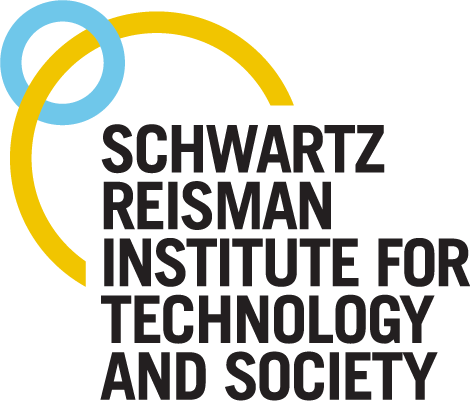
Embedded Ethics Education Initiative
The Embedded Ethics Education Initiative (E3I) is a collaborative venture at the University of Toronto between the Department of Computer Science and the Schwartz Reisman Institute for Technology and Society, in association with the Department of Philosophy.
Mission
To develop and evaluate methods for endowing and empowering the next generation of scientists, educators, and technology developers with the knowledge, skills, and incentive to incorporate ethics in the study of computer science, and as a design principle in the development of computer science technology—throughout their careers.
Jump to:
Overview / Project leads / How it works / Research insights / Impact on learning / How to build an E3I program / E3I Teaching fellowship
Overview
The Embedded Ethics Education Initiative (E3I) is a groundbreaking program at the University of Toronto that invites undergraduate computer science students to contemplate the broader implications of the technologies they are studying. Launched in 2020, E3I responds to the growing impact of technology on society and the urgent need to equip students with the skills to identify and reason through ethical and social issues that may arise during their careers as technology designers and developers. Rather than advocating for a particular viewpoint, E3I encourages students to independently navigate issues with curiosity and intellectual rigour.
The first program of its kind in Canada and among the first globally, E3I takes an innovative approach to curriculum development by leveraging a unique collaboration between computer scientists and philosophers. Each E3I module pairs ethical and technological material and is co-designed and co-taught by faculty from both disciplines. The modules are integrated into computer science courses across every year of study and use educational best practices such as active and discovery-based learning.
A collaboration between U of T’s Department of Computer Science and the Schwartz Reisman Institute for Technology and Society, in association with the Department of Philosophy, E3I has become a foundational part of the computer science experience at U of T.
Through the Embedded Ethics Education Initiative, students gain the tools to:
Identify and address ethical issues in the workplace and in tech development.
Consider the full range of stakeholders impacted by technological systems.
Integrate ethical considerations into the design and deployment of software and systems.
Feel empowered and equipped to raise ethical concerns in academic settings and the workplace.
In 2024, the E3I team was honoured with the Northrop Frye Award, one of U of T’s most prestigious recognitions, for their outstanding contribution to reimagining and enhancing the student learning experience. In 2025, the E3I team was honoured with the national D2L Innovation Award in Teaching and Learning, in recognition of its groundbreaking approach to integrating ethics into computer science education.
Project leads
Sheila McIlraith
Professor, Department of Computer Science, University of Toronto
Canada CIFAR AI Chair, Vector Institute
Associate Director & Research Lead, Schwartz Reisman Institute for Technology and Society
Diane Horton
Professor (Teaching Stream), Department of Computer Science, University of Toronto
Faculty Affiliate, Schwartz Reisman Institute for Technology and Society
David Liu
Associate Professor (Teaching Stream), Department of Computer Science, University of Toronto
Associate Chair, Undergraduate Studies, Department of Computer Science
Faculty Affiliate, Schwartz Reisman Institute for Technology and Society
Steven Coyne
Assistant Professor (Teaching Stream, CLTA), Departments of Philosophy and Computer Science, University of Toronto
Faculty Affiliate, Schwartz Reisman Institute for Technology and Society
How the E3I program works
A key to the success of the Embedded Ethics Education Initiative is its collaborative, interdisciplinary approach. Ethics is not an add-on or guest lecture within the computer science curriculum; each module is woven into the content of a course and addresses an issue that arises naturally. The participation of both computer science and philosophy professors enables students to explore current, real-world ethical issues alongside technical solutions.
In a game design course, after learning techniques to make a game very compelling, students discuss game addiction and explore reward structures and automatic turn-offs that can mitigate the risk.
Students in a machine learning course learn how machine learning algorithms are used at scale in recommender systems like Netflix and Facebook and then discuss whether those algorithms should maximize preference satisfaction or some other target like content diversity or well-being.
When learning about an abstract network flow algorithm, students apply it to the distribution of a scarce resource and consider different notions of fairness and distributive justice.
After learning how deletion of data is implemented in databases, students discuss considerations that may guide the decision of whether or not to fulfill a user request to delete data, including data ownership, freedom of speech, and the right to be forgotten.
This interweaving of technical and ethics concepts ensures that students see ethical considerations as a core part of technology design, not as an afterthought.
Each module typically includes:
Two hours of class time which combines short lectures with active-learning exercises.
Pre-class preparation such as videos or quizzes, to introduce key concepts.
Graded assignments, including reflective writing or ethical components embedded in course projects.
Research insights
The development and evolution of the E3I program is guided by a strong research foundation. Through ongoing studies, peer-reviewed publications, and knowledge sharing across disciplines and institutions, the team is continually evaluating the program’s impact and refining its approach.
Longitudinal study on student learning
To inform the design of the E3I program, and to understand E3I's impact over time over time, the team is conducting a multi-year longitudinal study approved by U of T’s Research Ethics Board. The study tracks changes in students’ attitudes, confidence, and skills related to ethics in technology.
Students complete surveys before and after taking part in E3I modules. These surveys include a custom-designed scale that measures ethical awareness and self-efficacy. By comparing responses from students who took E3I modules with a control group who did not, the team can assess how the program influences learning outcomes both in the classroom and during internships or work placements.
The study has already contributed to several academic peer-reviewed publications and continues to inform the ongoing development of the program.
Academic publications
Embedding ethics in computer science courses: Does it work? Diane Horton, Sheila A. McIlraith, Nina Wang, Maryam Majedi, Emma McClure, and Benjamin Wald. 2022. In Proceedings of the 53rd ACM Technical Symposium on Computer Science Education - Volume 1 (SIGCSE 2022). A study of two embedded ethics modules in a CS2 course found significant gains in students’ interest and confidence in addressing ethical issues. This results show that event a modest intervention can have a positive impact, encouraging broader adoption, innovation, and assessment of embedded ethics pedagogy.
Is more better when embedding ethics in CS courses? Diane Horton, David Liu, Sheila A. McIlraith, and Nina Wang. 2023. In Proceedings of the 54th ACM Technical Symposium on Computer Science Education V. 1 (SIGCSE 2023). We report on a study examining the impact of experiencing embedded ethics modules in multiple courses. Among our findings, our results suggest that more is not necessarily better—that a modest number of periodic exposures to modules over the course of a degree program may be sufficient to achieve sustained positive attitudes and self-efficacy among students.
Do embedded ethics modules have impact beyond the classroom? Diane Horton, David Liu, Sheila A. McIlraith, Steven Coyne, and Nina Wang. 2024. In Proceedings of the 55th ACM Technical Symposium on Computer Science Education V. 1 (SIGCSE 2024). We report on a study that investigates whether embedded ethics modules have an impact beyond the classroom. Specifically, we examine whether embedded ethics modules influence students to learn more about ethics on their own, whether students are better able to recognize ethical issues when they enter the workplace for an industrial or research work experience, and whether they report that the modules they participated in helped them to navigate the ethical situations they encountered at work.

Impact on learning
The Embedded Ethics Education Initiative is a cornerstone of undergraduate education in the Department of Computer Science at the University of Toronto. Each year, E3I sees over 10,000 undergraduate student enrollments—roughly 9,000 in computer science, and close to 2,000 in engagements with other disciplines initiated through E3I outreach across the university.
But it's not just the scale of E3I that sets it apart—it's the lasting impact it has on students, broadening their perspectives and sense of responsibility, and endowing them with skills and training that will prepare them for their professional careers.
Testimonials
On E3I modules in the classroom:
“Incredibly eye-opening and memorable.”
“Taught me an important lesson in that just because you can do something, even if it isn’t malicious, it doesn’t make it ethically okay.”
“The most impactful part was realizing just how many stakeholders there were. I didn’t realize my actions could impact that many people.”
“I was particularly interested in the discussion on harmless wrongs... as it brought to light some issues that we may not initially consider to be significant but actually are very important.”
“Seeing how there was a security flaw in the every-day functions we use in the course and hearing about the accompanied anecdote about how somebody actually exploited it and it had real world consequences I felt brought an ‘Okay, this is really serious moment to me.”
“Real-world case studies... help see the direct relevance of ethical considerations to future careers.”
How E3I influences students in their internships:
“I opted to include accessibility features out of my own pocket when it was not called for.”
“As a data engineer, I was exposed to data that would have been considered personal data. The data may or may not have been collected ethically, and my previous embedded ethics modules helped me recognize this situation and handle the data more carefully.”
“I was able to speak more confidently about ethics and issues related to my specific scenario.”
“I felt like I had the proper language to express my concerns accurately and precisely.”

Beyond computer science
The success of E3I has inspired interest from other U of T departments to learn how to embed ethics into other fields of study. Modules have been developed and are being piloted in ecology and evolutionary biology, geography and planning, and actuarial science. The team is also working with faculty members in statistical sciences to pilot an ethics program for their undergraduates.
How to build an embedded ethics program
On May 28, 2024, E3I faculty leads Sheila McIlraith, Diane Horton, David Liu, and Steven Coyne hosted a three-part webinar series, “Building an Embedded Ethics Education Initiative,” to help train educators from other post-secondary institutions on how to design and implement embedded ethics initiatives in their own departments. The event drew more than 100 participants, including 88 academics representing 64 different institutions.
By demonstrating that ethical considerations can be integrated seamlessly—and meaningfully—into technical courses, E3I challenges the traditional boundaries between STEM and the humanities. E3I is a reflection of this shift towards a more collaborative, cross-disciplinary approach to research and solutions that is a hallmark of the Schwartz Reisman Institute for Technology and Society.
Explore the session recordings:
Session 1: An overview of E3I | Lessons learned on teaching approaches, logistics, and strategies for building and scaling a program.
Session 2: Lessons learned on teaching approaches, logistics, and strategies for growing a program | How to design effective ethics modules that integrate seamlessly with existing course content.
Session 3: How to craft successful ethics modules that pair with existing course content | Insights into sustaining cross-disciplinary collaboration and growing institutional support.

Embedded Ethics Graduate Teaching Fellowship
The SRI Embedded Ethics Graduate Teaching Fellowship recognizes graduate students in philosophy and adjacent disciplines who are engaging in cross-disciplinary teaching assistantships in support of E3I. The fellowship includes recognition as members of the SRI research community, community engagement with other SRI graduate fellows and the broader SRI community, and a stipend based on experience and duration of engagement with the E3I program.








